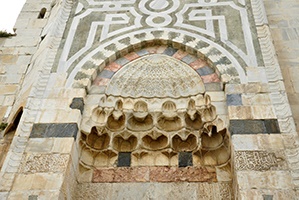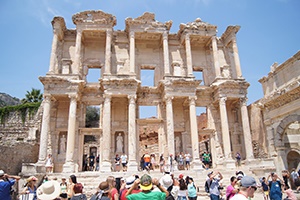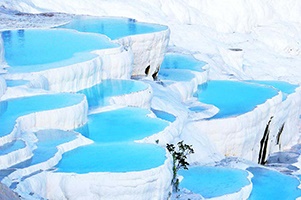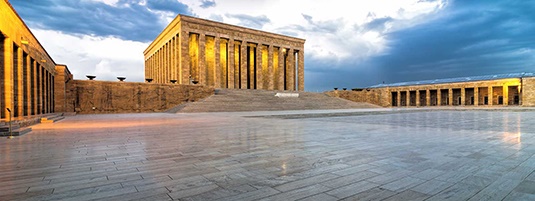Mahan Air Airline, Arrival at Istanbul Ataturk Airport
[Outbound (Connecting)] - Kuala lumpur / Tehran
Departure: 23:15
Arrival: 02:45 (+1)
- Tehran / ATATURK
Departure: 05:50
Arrival: 08:35
Mahan Air Airline, Departure from Ankara Esenboga Airport
[Inbound (Connecting)] - ANKARA / Tehran
Departure: 11:00
Arrival: 13:50
- Tehran / Kuala Lumpur
Departure: 21:30
Arrival: 10:00 (+1)
Day 1: Istanbul (Arrival)
Old City Tour:
Upon arrival start the historical tour of the Old City of Istanbul, including the Blue Mosque, the Hippodrome, photo stop in front of Hagia Sophia, Topkapı Palace, the residence of the Ottoman Sultans for almost four centuries, Grand Bazaar, shopping in the 4500 shops of the Grand Bazaar. Then, visit Suleymaniye Mosque, built by Sultan Suleyman. (Lunch, Dinner)
- Blue Mosque
The Sultan Ahmed Mosque is a historic mosque located in Istanbul, Turkey. A popular tourist site, the Sultan Ahmed Mosque continues to function as a mosque today; men still kneel in prayer on the mosque’s lush red carpet after the call to prayer. The Blue Mosque, as it is popularly known, was constructed between 1609 and 1616 during the rule of Ahmed I.
- Hippodrome
The Hippodrome of Constantinople was a circus that was the sporting and social centre of Constantinople, capital of the Byzantine Empire. Today it is a square named Sultanahmet Meydanı (Sultan Ahmet Square) in the Turkish city of Istanbul, with a few fragments of the original structure surviving.
- Topkapi Palace
The Topkapı Palace, or the Seraglio, is a large museum in Istanbul, Turkey. In the 15th century, it served as the main residence and administrative headquarters of the Ottoman sultans.
- Grand Bazaar
The Grand Bazaar in Istanbul is one of the largest and oldest covered markets in the world, with 61 covered streets and over 4,000 shops which attract between 250,000 and 400,000 visitors daily. In 2014, it was listed No.1 among the world’s most-visited tourist attractions with 91,250,000 annual visitors. The Grand Bazar at Istanbul is often regarded as one of the first shopping malls of the world.
- Suleymaniye Mosque
The Süleymaniye Mosque is an Ottoman imperial mosque located on the Third Hill of Istanbul, Turkey. The mosque was commissioned by Suleiman the Magnificent and designed by the imperial architect Mimar Sinan. An inscription specifies the foundation date as 1550 and the inauguration date as 1557. It is the second largest mosque in the city, and one of the best-known sights of Istanbul.
O/N Istanbul Day 2: Istanbul – Bursa
[3 h 00 min] Bursa Tour:
After breakfast, we will drive to Bursa former capitol city of Ottomans then, visit Grand Mosque, Green Mosque, Green Mausoleum and the Silk Market where time will be allocated to shop for local souvenirs. Also, you can see many Han (Caravanserais) and Turkish Baths in the Bursa City centre. Opportunity to see local products of the region like chestnut, honey, olive oil, Turkish delight. Visit the Turkish Delight & Olive Oil Outlet centre. (Breakfast, Lunch, Dinner)
- Grand Mosque
Bursa Grand Mosque is a mosque in Bursa, Turkey. Built in the Seljuk style, it was ordered by the Ottoman Sultan Bayezid I and built between 1396 and 1399. The mosque has 20 domes and 2 minarets.
- Grand Mosque
Bursa Grand Mosque is a mosque in Bursa, Turkey. Built in the Seljuk style, it was ordered by the Ottoman Sultan Bayezid I and built between 1396 and 1399. The mosque has 20 domes and 2 minarets.
- Green Mosque
Green Mosque, also known as Mosque of Mehmed I, is a part of the larger complex (a külliye) located on the east side of Bursa, Turkey, the former capital of the Ottoman Turks before they captured Constantinople in 1453. The complex consists of a mosque, türbe, madrasah, kitchen and bath.
- Green Mausoleum
The Green Tomb is a mausoleum of the fifth Ottoman Sultan, Mehmed I, in Bursa, Turkey. It was built by Mehmed’s son and successor Murad II following the death of the sovereign in 1421. The architect, Hacı Ivaz Pasha designed the tomb and the Yeşil Mosque opposite to it.
- Silk Market
Situated between Bursa Grand Mosque and Orhan Mosque, Kozahan was built by the great architect Abdul Ula Bin Pulat Sah as a foundation for historical works in Istanbul by the order of Ottoman Sultan Bayezid II in 1491.
O/N Bursa Day 3: Bursa – Kuşadasi
[5 h 40 min] - Ephesus, Isabey Mosque
After breakfast drive to Ephesus Area. Then, visit the Isabey Mosque and Ephesus Ancient City, the most visited ruins site in Turkey. The facade of the Celsus library alone is worth the trip. Walking through the huge amphitheatre will make you want to try out your singing skills. It is still used every year for live concerts and has a definite aura surrounding it. (Breakfast, Lunch, Dinner)
- Isabey Mosque
The İsa Bey Mosque, constructed in 1374–75, is one of the oldest and most impressive works of architectural art remaining from the Anatolian beyliks. The mosque is situated on the outskirts of the Ayasluğ Hills at Selçuk, İzmir.
- Ephesus Ancient City
Ephesus was an ancient Greek city on the coast of Ionia, three kilometres southwest of present-day Selçuk in İzmir Province, Turkey. It was built in the 10th century BC on the site of the former Arzawan capital by Attic and Ionian Greek colonists. During the Classical Greek era, it was one of the twelve cities of the Ionian League. The city flourished after it came under the control of the Roman Republic in 129 BC.
After city tour will go for shopping in evening.
O/N Kuşadasi  Isabey Mosque
Isabey Mosque  Ephesus Ancient City
Ephesus Ancient CityDay 4: Kuşadasi – Pamukkale
[2 h 40 min (200 km)] Pamukkale Tour: In the morning, enjoy a live fashion show at the leather outlet centre. Then, we will drive to Pamukkale and visit the amazing travertines (calcium pools) in Pamukkale and explore the ruins of the ancient Roman spa town of Hierapolis. This World Heritage-listed site stands as a monument to the wonder of nature. Overnight in Pamukkale. (Breakfast, Lunch, Dinner)
- Calcium Pools
Pamukkale, meaning “cotton castle” in Turkish, is a natural site in Denizli in southwestern Turkey. The area is famous for a carbonate mineral left by the flowing water. It is in Turkey’s Inner Aegean region, in the River Menderes valley, which has a temperate climate for most of the year.
- Hierapolis
Hierapolis was an ancient city located on hot springs in classical Phrygia in southwestern Anatolia. Its ruins are adjacent to modern Pamukkale in Turkey and currently comprise an archaeological museum designated as a UNESCO World Heritage Site.
O/N Pamukkale  Calcium Pools
Calcium Pools  Hierapolis
HierapolisDay 5: Pamukkale – Konya – Cappadocia
[10 h (637 km)] Konya Mevlana Museum, Sultanhani Tour: After breakfast, will drive to Konya, the most conservative city in Turkey. Konya, best known for its devout followers of the Sufi sect of İslam (Whirling Dervish). Here we will visit the Whirling Dervish Museum and the Mevlana Mausoleum. After lunch, we depart for Cappadocia. Along the way, we will stop in Sultanhani, the world’s largest Caravanserai. Overnight in Cappadocia. (Breakfast, Lunch, Dinner)
- Whirling Dervish Museum
Aside from the distinctive skyline of minarets and domes, the fairy chimney landscape of Cappadocia and the gigantic carved statues of Mount Nemrut, there can be few less symbolic images of Turkey than that of the tall-hatted Whirling Dervishes, of the Mevlevi (or Mawlawi) order. This mystic branch of Sufism was founded in 1273, by the followers of Mevlana Celaleddin-i Rumi, a Muslim saint and Anatolian mystic.
- Mevlana Mausoleum
The Mevlâna Museum, located in Konya, Turkey, is the mausoleum of Jalal ad-Din Muhammad Rumi, a Persian Sufi mystic also known as Mevlâna or Rumi. It was also the dervish lodge (tekke) of the Mevlevi order, better known as the whirling dervishes.
- Sultanhani
Located on Konya and Aksaray Road, famous Sultan Hani Caravanserai is the biggest masterpieces in Seljuk Period. This glorious structure was built by grand architect Muhammad bin Havlan el-Dimiski by the order of Anatolia Seljuk Sultan Aladdin Keykubat I between 1228 and 1229.
O/N Cappadocia Day 6: Cappadocia
Cappadocia Tour:
Today we visit one of the Underground City where early Christians lived secretly in order to survive and keep their faith. Picture stops will be given at the Valley of the Birds and at the foot of the Uchisar Castle. Lunch will be at around Avanos followed by the famous local pottery workshop. Then visit Derwent Valley & Pasabag Valley which has unique volcanic formations. Stop by local carpet weaving cooperative to see hand-made Turkish carpets. Dinner and overnight in Cappadocia. (Breakfast, Lunch, Dinner)
- ** Optional Hot Air Balloon Tour and Turkish Night Cultural Show.
- Underground City
The Derinkuyu underground city is an ancient multi-level underground city in the Derinkuyu district in Nevşehir Province, Turkey. Extending to a depth of approximately 60 metres (200 ft), it is large enough to have sheltered as many as 20,000 people together with their livestock and food stores. It is the largest excavated underground city in Turkey and is one of several underground complexes found across Cappadocia.
- Uchisar Castle
Uchisar is situated at the highest point in Cappadocia, on the Nevsehir-Goreme road, just 5 km from Goreme. The top of the Uchisar Castle provides a magnificent panorama of the surrounding area with Mount Erciyes in the distance.
- Derwent Valley
Devrent Valley reveals many different rock formations and is only a 10-minute drive from Goreme. The small fairy chimneys in the valley form a lunar landscape, or moonscape, by their strange look. The valley also has many animal shaped rocks. It looks like a sculpture zoo made by nature.
- Pasabag Valley
Pasabag in Cappadocia is located on the road to Zelve, coming from Goreme or Avanos. Highly remarkable earth pillars can be seen here, in the middle of a vineyard, hence the name of the place which means: the Pacha’s vineyard. Pacha means “General”, the military rank, in Turkish and it is a very common nick name. This site is also called Monks Valley. The name was derived from some cones carved in tuff stones which stand apart
O/N Cappadocia Day 7: Cappadocia – Ankara
[3 h 30 min (360 km)] Ankara and Salt Lake Tour: After breakfast, visit Ankara, as a Capitol City of Turkey, we will visit Mausoleum of Atatürk, founder of the Turkish Republic. Along the way, we will stop in Salt Lake, the largest Salt Lake of Turkey. Overnight in Ankara. (Breakfast, Lunch, Dinner)
- Mausoleum of Atatürk
Anıtkabir is the mausoleum of Mustafa Kemal Atatürk, the leader of the Turkish War of Independence and the founder and first President of the Republic of Turkey. It is in Ankara and was designed by architects Professor Emin Onat and Assistant Professor Ahmet Orhan Arda, whose proposal beat 48 other entries from several countries in a competition held by the Turkish Government in 1941 for a “monumental tomb” for Atatürk.
- Salt Lake
Lake Tuz is the second largest lake in Turkey with its 1,665 km2 (643 sq mi) surface area and one of the largest hypersaline lakes in the world. It is in the Central Anatolia Region, 105 km (65 mi) northeast of Konya, 150 km (93 mi) south-southeast of Ankara and 57 km (35 mi) northwest of Aksaray.
O/N Ankara  Mausoleum of Atatürk
Mausoleum of Atatürk  Salt Lake
Salt LakeDay 8: Ankara (Departure)
In the morning after breakfast drive to Airport in Istanbul to fly back home.
Mahan Air Airline, Departure from Ankara Esenboga Airport ACCOMODATION | City | Hotels | Night |
| Istanbul | Ramada Encore, Midmar Hotel or similar | 1 |
| Bursa | Tiara Hotel or similar | 1 |
| Kuşadası | Royal Palace Hotel, Ramada Hotel or similar | 1 |
| Pamukkale | Ninova Hotel, Tripolis Hotel or similar | 1 |
| Cappadocia | Surban Hotel, Dinler Hotel or similar | 2 |
| Ankara | Demora, Holiday Inn Hotel or similar | 1 |